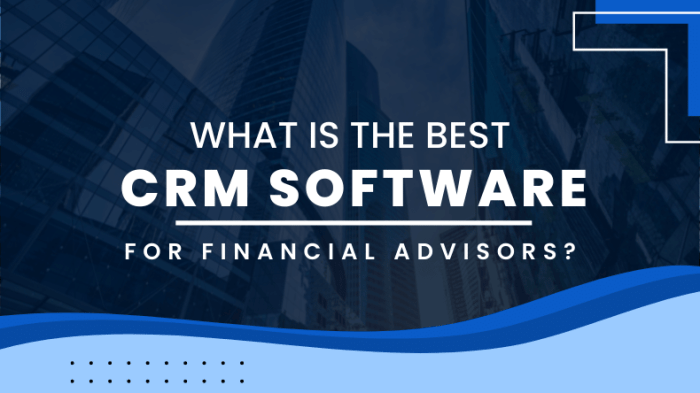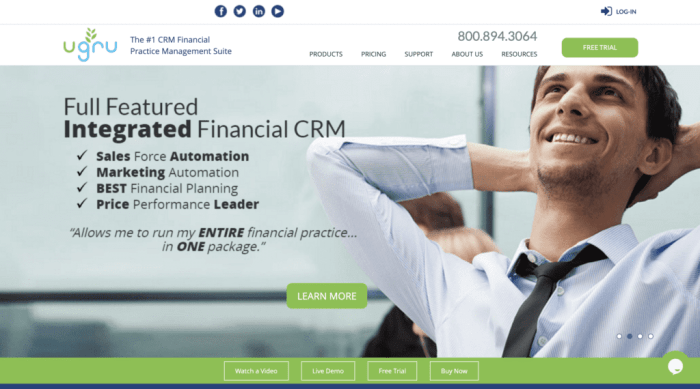In today’s competitive financial landscape, managing client relationships effectively is paramount for success. Financial advisor CRM software provides a centralized system to streamline operations, enhance client engagement, and ultimately, boost profitability. This comprehensive guide delves into the intricacies of financial advisor CRM software, exploring its features, benefits, selection process, and frequently asked questions.
Understanding the Role of CRM in Financial Advisory
A Customer Relationship Management (CRM) system, specifically designed for financial advisors, goes beyond simple contact management. It acts as a central hub for all client-related information, automating tasks, improving communication, and fostering stronger client relationships. This translates to increased efficiency, reduced administrative burden, and enhanced client satisfaction, leading to improved business outcomes.

Source: skylinesocial.com
Key Features of Financial Advisor CRM Software
- Contact Management: Centralized storage and management of client contact details, including personal information, investment portfolios, and communication history. This eliminates the need for scattered spreadsheets and ensures data accuracy.
- Client Portfolio Management: Tracking client assets, investment performance, and risk profiles. This allows for personalized financial planning and informed investment decisions.
- Communication Management: Facilitating seamless communication with clients through email, phone calls, and secure messaging. Automated email sequences and appointment scheduling tools enhance efficiency.
- Document Management: Secure storage and retrieval of important client documents, such as contracts, financial statements, and tax returns. This ensures compliance and easy access to crucial information.
- Reporting and Analytics: Generating comprehensive reports on client activity, portfolio performance, and business metrics. This data-driven approach enables informed decision-making and strategic planning.
- Workflow Automation: Automating repetitive tasks such as client onboarding, appointment reminders, and report generation. This frees up time for advisors to focus on high-value activities.
- Compliance and Security: Ensuring compliance with industry regulations, such as GDPR and SEC rules, through secure data storage and access controls. This is crucial for maintaining client trust and avoiding legal issues.
- Integration Capabilities: Seamless integration with other financial tools and platforms, such as accounting software, portfolio management systems, and marketing automation platforms. This creates a holistic view of the client and their financial situation.
Benefits of Implementing Financial Advisor CRM Software
Adopting a robust financial advisor CRM offers a multitude of benefits, significantly impacting efficiency, productivity, and client relationships. These benefits extend to:

Source: serchen.com
- Improved Client Relationships: Personalized communication and proactive service enhance client satisfaction and loyalty.
- Increased Efficiency: Automation of tasks reduces administrative burden and frees up time for advisors to focus on client interaction and strategic planning.
- Enhanced Productivity: Streamlined workflows and centralized data access improve overall productivity and allow advisors to manage a larger client base.
- Better Compliance: Secure data storage and access controls ensure compliance with industry regulations.
- Data-Driven Decision Making: Comprehensive reporting and analytics provide insights into client behavior and business performance, enabling informed decision-making.
- Scalability and Growth: A well-chosen CRM system can easily scale to accommodate business growth and expansion.
- Improved Revenue Generation: By improving efficiency and client relationships, a CRM contributes to increased revenue generation.
Choosing the Right Financial Advisor CRM Software
Selecting the right CRM is crucial for maximizing its benefits. Consider these factors:
Key Considerations for Selection:, Financial advisor crm software
- Features and Functionality: Assess the software’s features to ensure they align with your specific needs and business requirements. Consider the size of your client base and the complexity of your operations.
- Integration Capabilities: Ensure the CRM integrates seamlessly with other financial tools and platforms you currently use.
- User-Friendliness: Choose a system that is intuitive and easy to use for both advisors and administrative staff. A complex system can hinder adoption and reduce its effectiveness.
- Scalability: Select a CRM that can accommodate your future growth and expansion plans.
- Cost and Pricing: Consider the total cost of ownership, including software licensing fees, implementation costs, and ongoing maintenance.
- Security and Compliance: Ensure the CRM meets industry security and compliance standards.
- Customer Support: Choose a vendor that offers reliable customer support and training resources.
Popular Financial Advisor CRM Software Options
Several reputable CRM providers cater specifically to the financial advisory industry. Research and compare different options based on your needs and budget. Some popular choices include (but are not limited to): Redtail CRM, Wealthbox, Salesforce Financial Services Cloud, and Junxure.
Frequently Asked Questions (FAQ)
- Q: What is the average cost of financial advisor CRM software? A: The cost varies significantly depending on the features, number of users, and vendor. Expect to pay anywhere from a few hundred dollars per month to several thousand dollars per year.
- Q: How long does it take to implement a financial advisor CRM? A: Implementation time depends on the complexity of the system and the size of your business. It can range from a few weeks to several months.
- Q: Is CRM software secure? A: Reputable CRM providers prioritize data security and compliance. Look for systems that offer robust security features, such as encryption and access controls.
- Q: Can I integrate my CRM with other financial software? A: Many CRMs offer integration capabilities with other financial tools, such as accounting software and portfolio management systems. Check the vendor’s specifications to ensure compatibility.
- Q: What are the key performance indicators (KPIs) to track with a CRM? A: Key KPIs include client acquisition cost, client retention rate, revenue per client, and overall client satisfaction.
Conclusion
Financial advisor CRM software is no longer a luxury but a necessity for firms seeking to thrive in a competitive market. By streamlining operations, enhancing client relationships, and providing data-driven insights, a well-chosen CRM can significantly contribute to the growth and success of your financial advisory business. Take the time to carefully research and select a system that aligns with your specific needs and budget to unlock the full potential of your practice.
References
While specific product websites would be ideal references, general resources on CRM and financial planning best practices can be found at sites like the Financial Planning Association (FPA) and the Certified Financial Planner Board of Standards (CFP Board).
Call to Action: Financial Advisor Crm Software
Ready to elevate your financial advisory practice? Explore the leading CRM solutions available today and request a demo to see how they can transform your business. Don’t wait – invest in the future of your firm!
General Inquiries
What are the key features to look for in financial advisor CRM software?
Key features include client relationship management (contact information, interaction history), task and workflow automation, reporting and analytics, integration with other financial software, security and compliance features, and scalability to accommodate growth.
How much does financial advisor CRM software cost?
Pricing varies greatly depending on the features, number of users, and vendor. Expect a range from subscription-based models with monthly fees to more comprehensive solutions with higher upfront costs.
How long does it take to implement financial advisor CRM software?
Implementation time depends on the complexity of the software and the size of the firm’s existing data. Expect a timeframe ranging from a few weeks to several months.
What is the best financial advisor CRM software?
There is no single “best” software; the ideal choice depends on your specific needs and budget. Research various options and compare features before making a decision.
